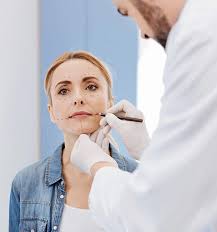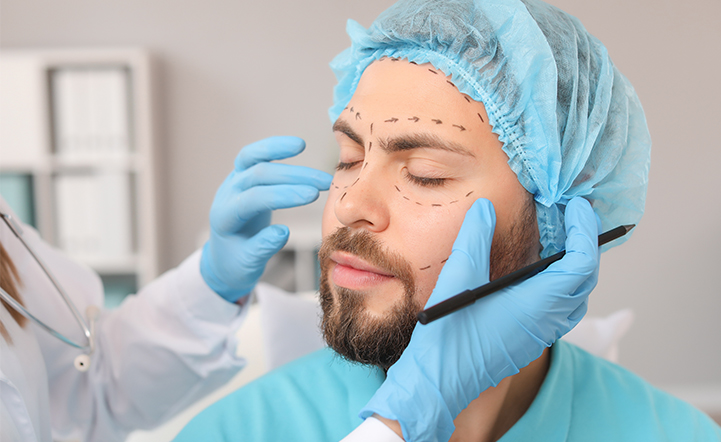Hello!
In the competitive world of plastic surgery, an effective SEO strategy is essential for attracting new patients to your practice. With so many people turning to the internet to research cosmetic procedures and find qualified surgeons, ranking highly in search engines like Google can make or break your business’s success.
This ultimate guide will cover everything you need to know about plastic surgeon SEO—from understanding the basics to implementing advanced tactics that will help you outrank your competitors and flood your clinic with new patient leads. Whether you’re just getting started with SEO or want to take your existing efforts to the next level, this comprehensive resource has you covered.
Let’s dive in!
What is Plastic Surgeon SEO?
 SEO stands for Search Engine Optimization, which is the practice of optimizing your website and online content to rank higher in search engine results for specific keywords related to your business.
SEO stands for Search Engine Optimization, which is the practice of optimizing your website and online content to rank higher in search engine results for specific keywords related to your business.
For plastic surgeons, effective SEO can mean the difference between appearing on page 6 of Google (where no one will find you) or claiming one of the coveted top 3 spots.
The goal of plastic surgeon SEO is simple: To make it as easy as possible for Google to understand what services you offer, where you’re located, and that you are the most authoritative, trustworthy option for prospective patients searching for cosmetic procedures in your area.
While paying for Google Ads can drive traffic to your site, SEO can attract a steady stream of free, organic traffic from motivated leads actively searching for the procedures and expertise you provide. And once you’ve invested the time and effort into a solid SEO strategy, those benefits will continue paying dividends for years.
The Importance of SEO for Plastic Surgeons
 If you’re still not convinced about prioritizing SEO, consider these statistics that emphasize just how critical it is for the success of any plastic surgery practice:
If you’re still not convinced about prioritizing SEO, consider these statistics that emphasize just how critical it is for the success of any plastic surgery practice:
- 93% of online experiences begin with a search engine like Google.
- The first organic website listing in Google’s search results averages a 28.5%click-through rate, while listings 2 and 3 get only 15% and 11%, respectively.
- 75% of searchers never scroll past the first page of search results.
- A strong Google ranking leads to a 53% increase in website traffic.
With figures like those, the evidence is clear – if you want a steady stream of new patient leads finding your plastic surgery website and booking consultations, you NEED to prioritize SEO and rank towards the top of search engine results pages (SERPs).
Local SEO for Plastic Surgeons
 Since most patients searching for cosmetic procedures will look for options nearby, local SEO is an essential piece of the puzzle.
Since most patients searching for cosmetic procedures will look for options nearby, local SEO is an essential piece of the puzzle.
After all, if you’re located in New York City, there’s no point in trying to rank for general keywords like “breast augmentation,” which will mostly pull up national sites and listings from bigger cities.
The key aspects of a successful local SEO strategy for plastic surgeons include:
Google Business Profile Optimization
Claiming and optimizing your Google Business Profile listing with accurate name, address, phone details, services offered, business hours, images, and actively generating positive reviews is critical for showing up in Google’s local pack and localized organic rankings.
“Near Me” Keyword Targeting
You’ll want to make sure your website’s content and metadata are optimized around location-based keywords like “plastic surgery Miami,” “breast augmentation Seattle,” “top plastic surgeon in Dallas,” and so on to signal to Google the geographic areas you want to target.
Localized Link Building
While backlinks from any authoritative, relevant websites carry weight from an SEO perspective, links from high-quality localized sources like community publications, local business directories, or sponsorships/partnerships help prove you are a trusted, established presence in your city or region.
How Google Ranks Plastic Surgery Websites
 To fully optimize your online presence through SEO, it’s helpful to understand some of the key factors that Google’s algorithm considers when evaluating and ranking websites for plastic surgery-related searches:
To fully optimize your online presence through SEO, it’s helpful to understand some of the key factors that Google’s algorithm considers when evaluating and ranking websites for plastic surgery-related searches:
- Technical website optimization: Google needs to be able to crawl, render, and index all of your website’s content easily. Site speed, navigation structure, mobile friendliness, schema markup, and other technical components all contribute to this piece of the puzzle.
- Relevance and context of on-page elements: The words, content, and multimedia on each page or post must align with the searcher’s intent behind a specific query. This spans components like title tags, headers, body copy, and image tags.
- Level of Expertise, Authoritativeness, & Trust (E-A-T): As a “Your Money or Your Life” (YMYL) category dealing with personal health, safety, and finances, Google scrutinizes plastic surgery content extra closely to gauge the expertise of the creator and the authoritativeness/trustworthiness of the information.
- User Engagement Signals: While Google is tight-lipped about exactly which metrics it uses, factors like click-through rate, average time on page, pages per session, and bounce rate can all be used to gauge the usefulness and quality of a page or website.
- Quality of External Links: The quantity, quality, relevance, and trust level of websites linking to your plastic surgery site and specific pages plays a huge role in Google’s determination of your own authority and ranking potential.
Now that we’ve covered some of the fundamental principles and importance of plastic surgeon SEO let’s jump into the specific strategies and tactics you’ll need to implement to get your website ranking on page 1 of Google.
Comprehensive Keyword Research
Before optimizing anything, you need to know what keywords and search terms your ideal potential patients use to find plastic surgeons and information about various procedures online. That’s where thorough keyword research comes in.
 With the right tools and approach, you can identify:
With the right tools and approach, you can identify:
- Keywords with high search volume and reasonable competition levels to initially target
- Long-tail, higher-intent phrases that your competitors may be overlooking
- Common questions and topics to guide your content creation and on-site optimization
- Local keywords, specifying procedures + cities you want to rank for in your geographic area
 The goal is to accumulate a well-rounded list of worthwhile keywords that:
The goal is to accumulate a well-rounded list of worthwhile keywords that:
- Are relevant to the procedures you offer and information prospective patients might need
- Have search volume levels that make pursuing them worthwhile
- Don’t have intense competition levels that bury your site without Herculean effort
- Align with different stages of the patient’s decision-making journey
Invest in premium SEO tools like Ahrefs, SEMRush, or KWFinder to gather more accurate search data for optimal results. You can also use free tools like Google’s Keyword Planner, Answer the Public, or Ubersuggest to build your keyword list.
Just make sure you think beyond just procedure names themselves. Terms related to pricing, preparation, recovery, reviews, comparisons, and specific techniques can all be golden opportunities to position your site as the go-to resource and attract prospective patients in different phases of their research process.
Advanced On-Page SEO and Content Optimization
Showing up in search results is only half the battle – you’ll need to work to make your website the obvious choice for prospective patients to click on. That means squeezing every last drop of SEO juice out of every page.
 Some of the top on-page elements to optimize include:
Some of the top on-page elements to optimize include:
- Title Tags – A page’s title tag is the most important element for proving relevance to a searcher’s query. Ensure you naturally incorporate your target keyword, enticingly convey the core topic, and stay within roughly 60 characters.
- Header Tags – Use your target keyword or related variations in your H1 (page title) and H2/H3 (section subheaders) tags to reinforce relevance and clarify your content structure.
- Body Content – Write long-form, in-depth content that comprehensively covers your target topic and keywords. Use semantically related terms and aim for at least 1500-2000+ words per page. Don’t overdo keyword usage – prioritize creating a good user experience.
- Image Optimization – To enhance page relevance, describe all images using your target keywords in filenames and alt text. Leverage descriptive captions to add context and semantically related terms.
- Internal Linking – Link to other important pages across your site using contextual anchor text to strategically distribute authority and create clear pathways for site visitors and search engines.
- URL Structure – Use a brief yet descriptive folder and page URLs containing your primary keywords to highlight page topics at a glance.
 Other optimizations may include:
Other optimizations may include:
- Schema markup to improve how page info appears in SERPs
- Multimedia embeds (videos, infographics, etc.) with transcripts/descriptions
- Bulleted/numbered points and tables to organize key pieces of information
- FAQ sections with common questions utilizing target keywords
Remember to ensure strong technical foundations, such as optimal page speed, mobile responsiveness, intuitive navigation, and clean code. Google measures all of these elements as part of its ranking process.
Local Landing Pages & Citation Building
If you want your plastic surgery website to start ranking well for local queries like “breast augmentation Cleveland” or “top rhinoplasty surgeons in Philadelphia,” you must build dedicated local landing pages optimized for those specific geographic areas and your target services.
Your local landing page strategy should aim to thoroughly cover your service areas and target cities by creating in-depth pages for every procedure x location combination you want to rank for.
 For example, a plastic surgeon’s site in Cleveland might have pages like:
For example, a plastic surgeon’s site in Cleveland might have pages like:
- /breast-augmentation/cleveland
- /liposuction/cleveland
- /facelift/akron
- /rhinoplasty/canton
- …and so on for every service in every local city
These pages should contain locally optimized content, NAP (Name, Address, Phone), maps, directions, area-specific images/media, testimonials from local patients, local links/citations, and clear calls-to-action for booking consultations. It’s all about signaling your local relevance to Google for that particular area.
Building up NAP listings and citations from authoritative local directories, chambers of commerce, sponsorships, and other local platforms is also a crucial local SEO tactic to prove your credibility and physical presence in each city you’re targeting.
Link Building for Authority and Credibility
 According to Google, the sheer quantity of links pointing to your website from other trusted sources is one of the biggest factors in how highly they’ll rank your pages in SERPs. High-quality, authoritative links signal that your content is legitimate and worth ranking.
According to Google, the sheer quantity of links pointing to your website from other trusted sources is one of the biggest factors in how highly they’ll rank your pages in SERPs. High-quality, authoritative links signal that your content is legitimate and worth ranking.
But building worthwhile backlinks isn’t as simple as submitting your website to a few web directories. Google is laser-focused on separating natural, credible links from spammy, manipulative tactics that attempt to “game” the system.
Some of the most trusted, sustainable link-building strategies for plastic surgeons include:
Guest Posting on Relevant Sites
In exchange for an author bio link pointing back to your site, provide exclusive, in-depth content on your areas of expertise, such as trusted health, beauty, lifestyle, or local publications.
Promotion of Premium Content Assets
Create highly valuable, thoroughly researched guides, studies, or multimedia assets that other sites will naturally want to reference and link to as credible resources for their own audiences.
Outreach to Existing Patient Networks
 Make it easy for existing, satisfied patients to share testimonials, reviews, and links to your site across their own blogs, social channels, and other platforms with an established audience.
Make it easy for existing, satisfied patients to share testimonials, reviews, and links to your site across their own blogs, social channels, and other platforms with an established audience.
Links from Local Publications, Community Sites, Event Listings
Engage with relevant local business communities, non-profit organizations, and community blogs/papers and aim to earn both editorial and standard citation-style links to show your real-world presence.
Optimizing YouTube Videos with Backlink Opportunities
Produce high-quality video content, optimize titles/descriptions/tags with target keywords, and link back to your website from video descriptions or annotations.
Regularly Monitor Link Profile Health
Use tools like Ahrefs, SEMRush, or Google Search Console to audit your backlink profile for potentially toxic links that need to be disavowed. Over time, you’ll want to improve the quantity and diversity of authoritative domains linking to your site.
As another YMYL category focused on people’s health and finances, thin or spammy backlink profiles can be an immediate red flag for Google that your website isn’t credible or trustworthy enough to rank for plastic surgery keywords.
Invest in Quality Content Creation
In its ongoing mission to provide the best, most authoritative, trustworthy information available on any given topic, Google has made it abundantly clear that it wants to see comprehensive, in-depth website content created by legitimate subject matter experts.
 For queries related to plastic surgery, Google wants to see content that:
For queries related to plastic surgery, Google wants to see content that:
- Provides complete, accurate information that leaves no aspect uncovered
- Showcases the direct expertise, knowledge, and credibility of the author(s)
- Responds thoroughly to search intent behind various keyword queries
- Highlights potential risks, complications, or negative outcomes transparently
- Cites reputable medical sources where appropriate
- Features unique insights, visuals, and helpful supplementary content
To satisfy these criteria, you’ll likely need to hire professional medical writers who can digest information from your surgeons, research papers, and other credible sources and produce authoritative yet readable content under your surgeon’s guidance and oversight. Simply rewriting encyclopedia entries or regurgitating competitor’s site copy won’t cut it.
Consistent Blogging and Topical Content Hubs
One of the best ways to build out a wealth of in-depth, authoritative content on your site that can continue attracting traffic for years is to publish detailed blog posts consistently.
 These posts let you:
These posts let you:
- Answer common patient questions surrounding procedures you specialize in
- Explore specific techniques, concerns, and technologies in your field
- Publish unique data, surveys, and studies you’ve conducted
- Build topically relevant internal linking structures and content hubs
Think of your blog as a vast educational resource where prospective patients can find substantive information at every phase of their decision-making process. Regularly creating new posts checks Google’s box for fresh, sustained content while each URL acts as a miniature content silo packed with targeted keywords and enriched topical relevance.
Some example blog post titles and topics for inspiration:
Breast Augmentation
- “What to Expect During Breast Augmentation Recovery”
- “Comparing Saline vs. Silicone Breast Implants: Pros and Cons”
- “Breast Augmentation Revision Surgery: When Is It Needed?”
- “The History of Breast Augmentation Surgery and Implants”
 Rhinoplasty
Rhinoplasty
- “How Young Is Too Young for a Rhinoplasty Procedure?”
- “Ethnic Rhinoplasty: What Makes It Different?”
- “5 Tips to Speed Up Recovery After Rhinoplasty Surgery”
- “Rhinoplasty vs. Non-Surgical Nose Job: What’s the Difference?”
In each case, you can produce meaty, 2000+ word articles packed with expertise and insights that position you as the go-to authority that Google wants to rank. Interlinking between related posts further reinforces your site’s topical relevance and sculpts that all-important content hub.
Influencer Marketing and Brand-Building
While all of the on-site and link-building tactics above are essential ingredients for a successful plastic surgeon SEO strategy, you’ll also want to devote effort to promoting your practice’s name and amplifying your own surgery reputation as a trusted experts in your field.
 This is where PR, influencer outreach, guest posting, and similar “brand-building” initiatives can shine. The more frequently your surgeons’ names, expertise, or practice shows up as a reputable source across high-visibility publications, television segments, podcasts, and other channels – the more Google will pick up on it as a positive reputational signal moving forward.
This is where PR, influencer outreach, guest posting, and similar “brand-building” initiatives can shine. The more frequently your surgeons’ names, expertise, or practice shows up as a reputable source across high-visibility publications, television segments, podcasts, and other channels – the more Google will pick up on it as a positive reputational signal moving forward.
Some potential avenues to explore include:
Contributing Expert Quotes to Publications
Reach out to the editors of online magazines, papers, and blogs covering medical, health, beauty, or local news with perspectives from your plastic surgeons on relevant stories or trends. Aim for publication links and author bio backlinks.
Setting Up Guest Appearances and Interviews
Get booked on television morning shows, podcasts, webinars, or YouTube channels with audiences interested in the procedures you offer. Leverage these for brand exposure and backlinks.
Collaborating with Relevant Influencers
 Connect with influencers or content creators in the health/beauty/wellness niche for guest posts, co-created guides, integrations, sponsorships, and more that expand your reach and digital footprint.
Connect with influencers or content creators in the health/beauty/wellness niche for guest posts, co-created guides, integrations, sponsorships, and more that expand your reach and digital footprint.
While not necessarily direct ranking factors, these efforts help shape Google’s perception of your plastic surgeons and practice as recognizable, go-to authorities in your field.
Over time, that strengthened brand presence is increasingly important in your site’s ranking potential and continued growth.
Developing an Educated Review Generation System
In addition to their other ranking factors, Google places significant weight on a plastic surgery practice’s online reviews and reputation signals. These show up directly in organic listings and factor into Google’s determination of your site’s credibility and local prominence.
A proactive system for asking patients for honest reviews is essential, as is responding professionally and compassionately to negative feedback. The goal should be a steady stream of new reviews on an ongoing basis.
 Some best practices to keep in mind include:
Some best practices to keep in mind include:
- Only ask for reviews, never incentivize positive ones specifically
- Send automated review reminders after appointments via text or email
- Provide direct links to make the process as easy as possible
- Respond quickly and graciously to all reviews, positive or negative
- Identify common pain points from negative reviews and look to address them
- Consider implementing reputation management software to streamline the review generation and response process across multiple sites, such as Google, Facebook, RealSelf, etc.
- Highlight your best reviews on a testimonials page and repurpose snippets across your website to build social proof and credibility
Claiming and Optimizing GMB and Directory Listings
As mentioned in the local SEO section, properly optimizing your Google Business Profile (formerly Google My Business) is critical to the ranking puzzle. This free listing is what allows your practice’s information to appear in the local map pack and helps Google understand where you’re located and what services you offer.
Complete every section thoroughly, including your business name, address, phone, website, hours of operation, service/product categories, and photos. Regularly update your GMB with new photos, posts, offers, and an up-to-date Q&A section responding to common queries.
 You’ll also want to claim and optimize listings on other prominent online directories like:
You’ll also want to claim and optimize listings on other prominent online directories like:
- Yelp
- RateMDs
- Healthgrades
- Vitals
- WebMD
- Yahoo Local
- Bing Places
Consistent name, address, and phone number (NAP) information that exactly matches what’s on your website is key, as is selecting all relevant practice categories and geo-specific descriptors.
Tracking Rankings and Results
The final critical component of any successful plastic surgeon SEO strategy is diligently tracking your rankings, organic traffic, leads, and revenue metrics over time. This allows you to identify what’s working and needs to be adjusted and calculate an accurate ROI from your SEO efforts.
 Some of the core data points to monitor include:
Some of the core data points to monitor include:
- Current rankings for each target keyword
- Organic traffic to your website
- Conversion rates from organic traffic
- Lead volume and scheduled consultations
- Revenue directly attributed to organic search
Use rank-tracking tools like Ahrefs, SEMRush, or Acclaim to get daily ranking updates across your targeted keywords and location/device combinations. Connect Google Analytics and Google Search Console to analyze your website’s organic traffic and audience behavior metrics. Have systems in place to track your intake of new leads and revenue from organic search specifically.
With this data, you can continually optimize your SEO strategy for maximum impact. If certain pages aren’t ranking as hoped for particular keywords, you may need further on-page tweaks or a fresh external linking approach. Your conversion funnels likely need refining if traffic is high but leads are low.
Conclusion
 Mastering plastic surgeon SEO is essential for any practice that wants to get found by prospective new patients searching online.
Mastering plastic surgeon SEO is essential for any practice that wants to get found by prospective new patients searching online.
While it requires an ongoing investment of time and effort, a comprehensive SEO strategy encompassing technical optimization, locally relevant content, authoritative link building, reputation management, and more can pay dividends for years through increased website traffic, leads, and revenue.
By following the tactics outlined in this guide, you’ll be well on your way to outranking your local competitors, solidifying your online authority, and ensuring a steady stream of new patient consultations from motivated leads who have found you organically through search engines. Stay committed, track your progress closely, and make SEO an integral part of your long-term digital marketing efforts.
SEO is a continuous cycle—once you’ve built a solid foundation, you must constantly monitor, adjust, and capitalize on new opportunities. The plastic surgeons and practices that commit to maintaining an active, data-driven SEO process will thrive online for years to come.
Thank you!
Join us on social media!
See you!






